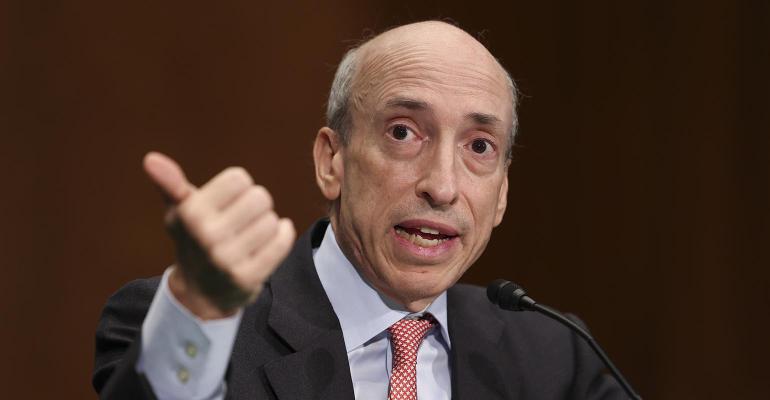Congress should play a greater role in the regulation of crypto assets and intermediaries, U.S. Sen. Pat Toomey (R-Penn.) told Securities and Exchange Commission Chairman Gary Gensler during his testimony before the Senate Banking Committee on Thursday.
In preliminary remarks during the committee’s oversight hearing for the agency, Toomey, the committee’s ranking member, said crypto intermediaries needed more clarity from the SEC on whether their digital assets should be considered securities, with the senator asking what the “crypto-specific roadmap” was for intermediaries to register.
“Given the novel nature of these tokens, really, Congress ought to step in and provide clarity,” Toomey said.
In his own testimony, Gensler acknowledged that the “vast majority” of the roughly 10,000 available crypto tokens were securities, meaning most crypto intermediaries (whether centralized or not) would need to register with the SEC with “each of their functions” (including potentially as broker/dealers), thus creating separate legal entities in order to mitigate conflicts.
But Gensler wasn’t concerned about confusion should Congress decide the SEC would share crypto oversight with other regulators, including the Commodity Futures Trading Commission. In response to questions posed by Committee Chairman U.S. Sen. Sherrod Brown (D-Ohio), Gensler said the SEC often shared jurisdiction with other authorities when it came to dual registrants in both the broker/dealer and in the fund advisor space.
“If Congress moved forward to give the CFTC greater authority on, let’s say, Bitcoin, we would work together, but we’ve already worked together dually on a number of enforcement actions in the crypto space,” Gensler said.
Gensler’s testimony comes as many in the industry await potential SEC rules for crypto assets and actors. The lack of clarity is keeping many wealth managers on the sidelines, according to Peter Keuls, a partner and global head of wealth management with Aon, which released a report this week in partnership with the Money Management Institute on how wealth managers and investors view crypto.
“As soon as that is settled, that will be a green light, and good for the value of these assets,” he said during an interview with WealthManagement.com. “That’s something for wealth managers to keep close eyes on.”
The report underscored many aspects of the crypto conversation, with nearly four out of 10 clients having asked their advisors about crypto investments (though analysts speculated that interest dropped during crypto’s recent market turmoil). Crypto interest remains highest among younger investors, with about 80% of under-35 respondents holding some kind of digital assets, and more than half having at least 60% of their portfolio in crypto.
For the report, analysts surveyed about 1,500 investors with minimum investable assets of $250,000, as well as about 820 advisors during Q1 2022. MMI and Aon found that only 14% of investors said they’d be “very likely” to add crypto if their wealth manager suggested it.
Keuls said the results showed wealth managers shouldn’t expect clients to rush to crypto should they offer it, and speculated that the lower interest level in crypto recommendations may stem from the perspective of younger investors.
“Part of it is that these younger crypto investors are used to using other platforms, not a traditional wealth manager,” he said. “It seems like there’s some loyalty to those platforms.”
Gensler’s testimony also focused on his continued requests for more funding from Congress for enforcement priorities, noting the agency had 4% fewer staff in 2021 than 2016, despite increases in the amount of jury trials, examinations and the amount of private funds managed by RIAs.
Toomey also criticized the SEC's approach to its proposed climate risk disclosure rules, arguing that external compliance costs could increase by more than double to $5.2 billion per year in total if the rule is finalized. He also put Gensler “on notice” that the U.S. Supreme Court may enter the fray, pointing toward the Court’s decision this summer against the Environmental Protection Agency limiting that agency’s ability to regulate carbon emissions.
“The SEC is wading into controversial public policy debates that are far outside its mission and its expertise, and they’re doing it without the legal authority to do so,” he said. “And in the process, the SEC risks politicizing the agency, slowing economic growth, increasing inflation and possibly endangering national security.”
When answering questions by Brown, Gensler argued the SEC was a disclosure-based regulator, as opposed to one assessing merit.
“But investors today want to know about climate risk because it matters to the future path of the performance, financial and other performance,” he said.




